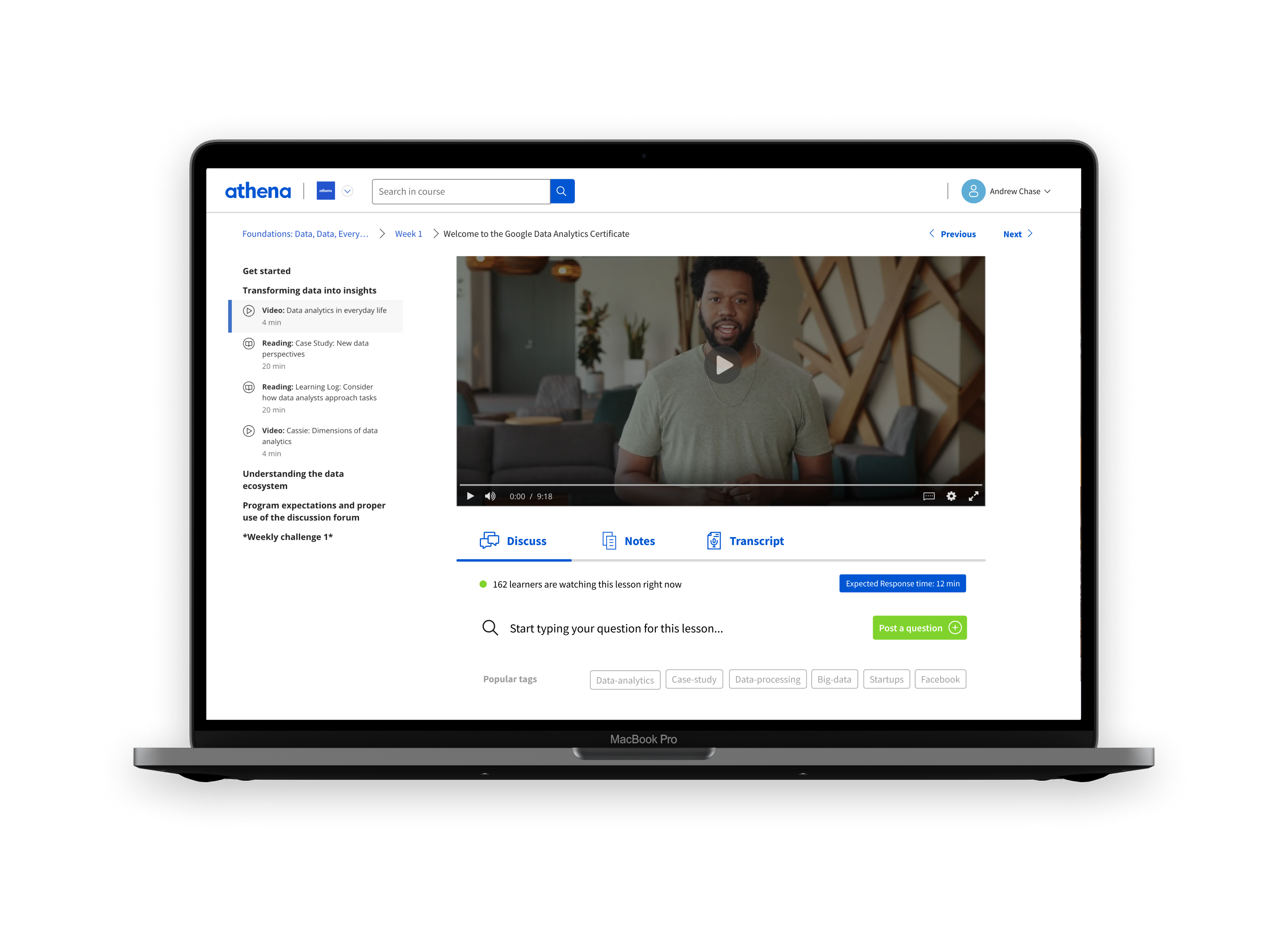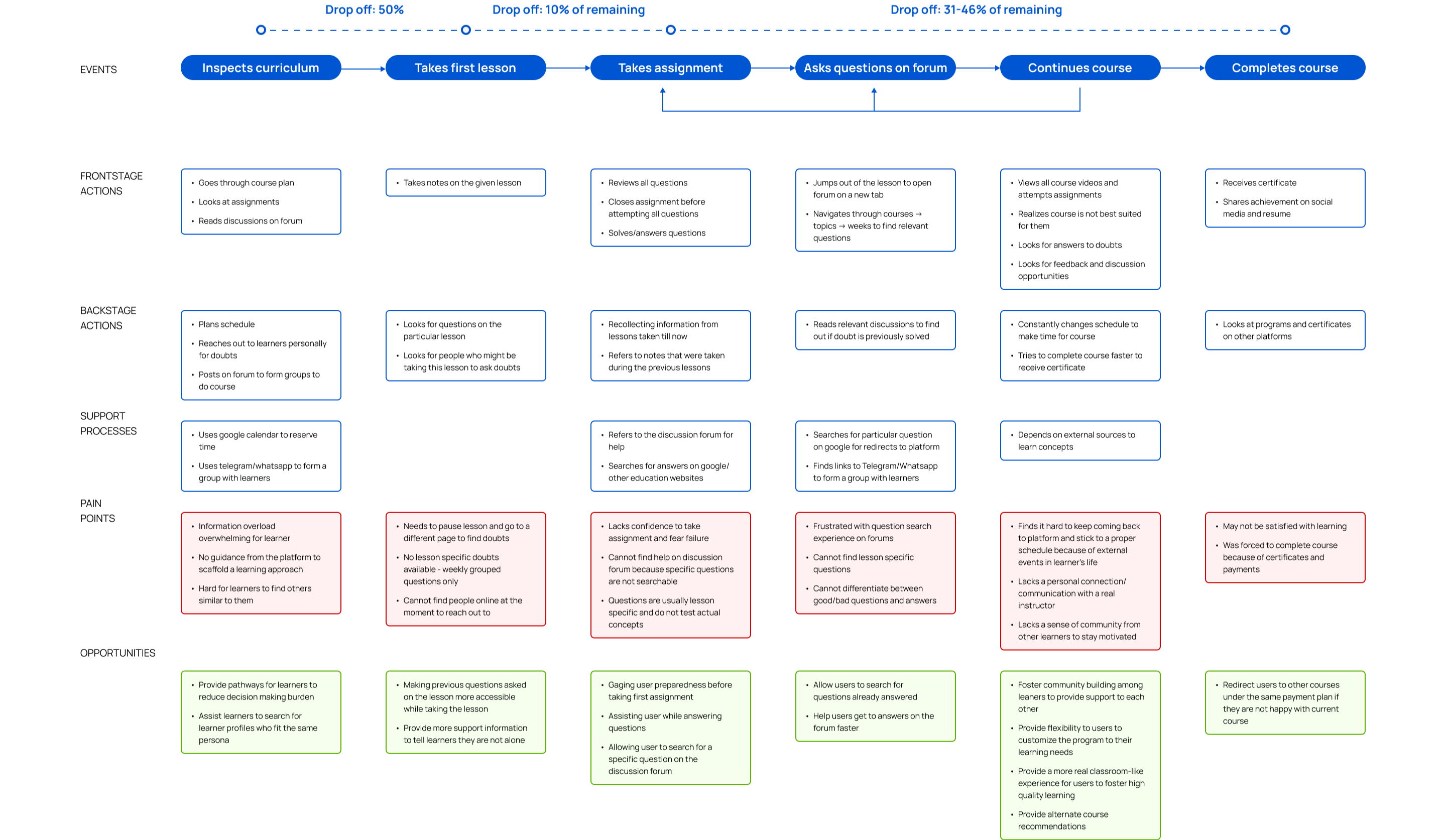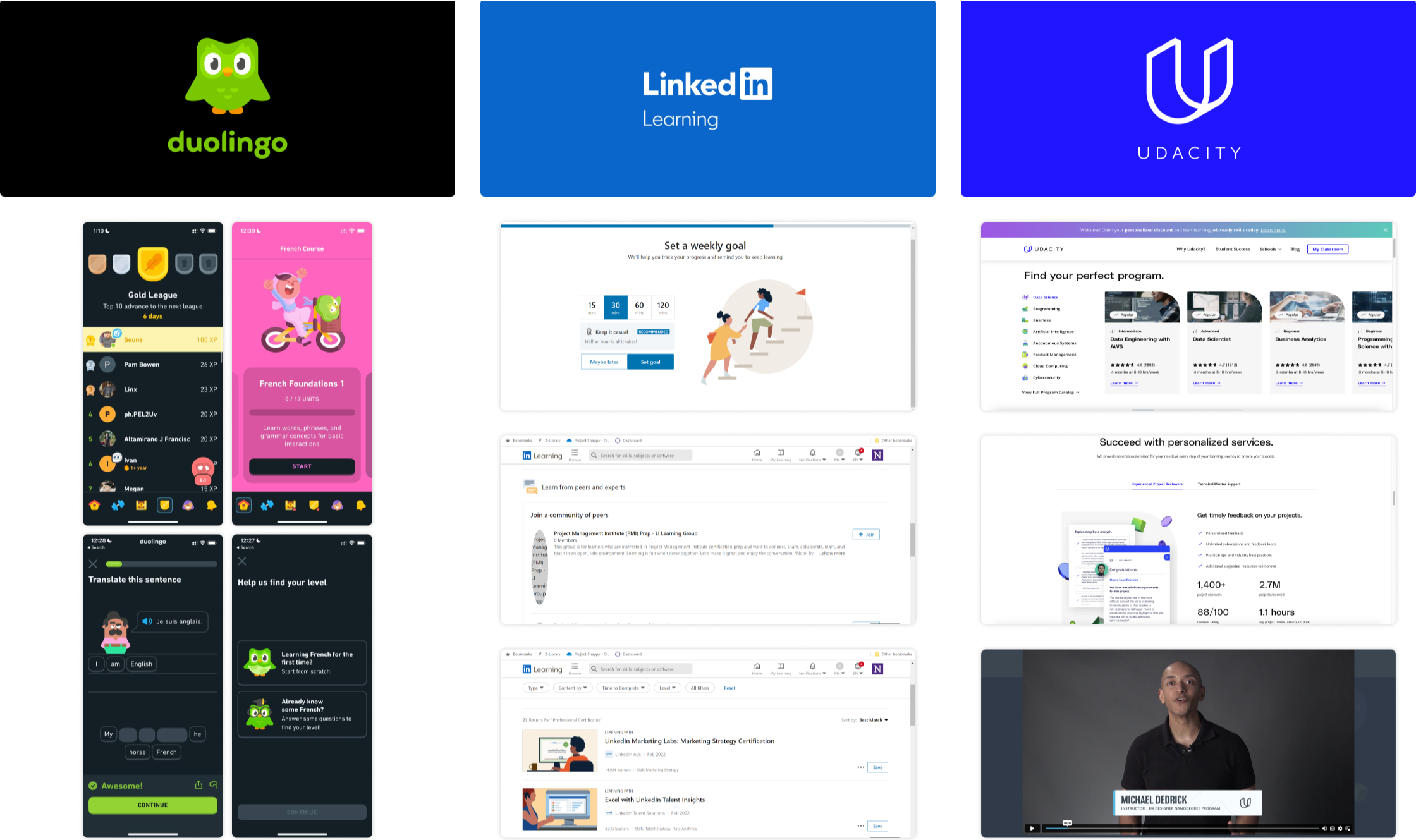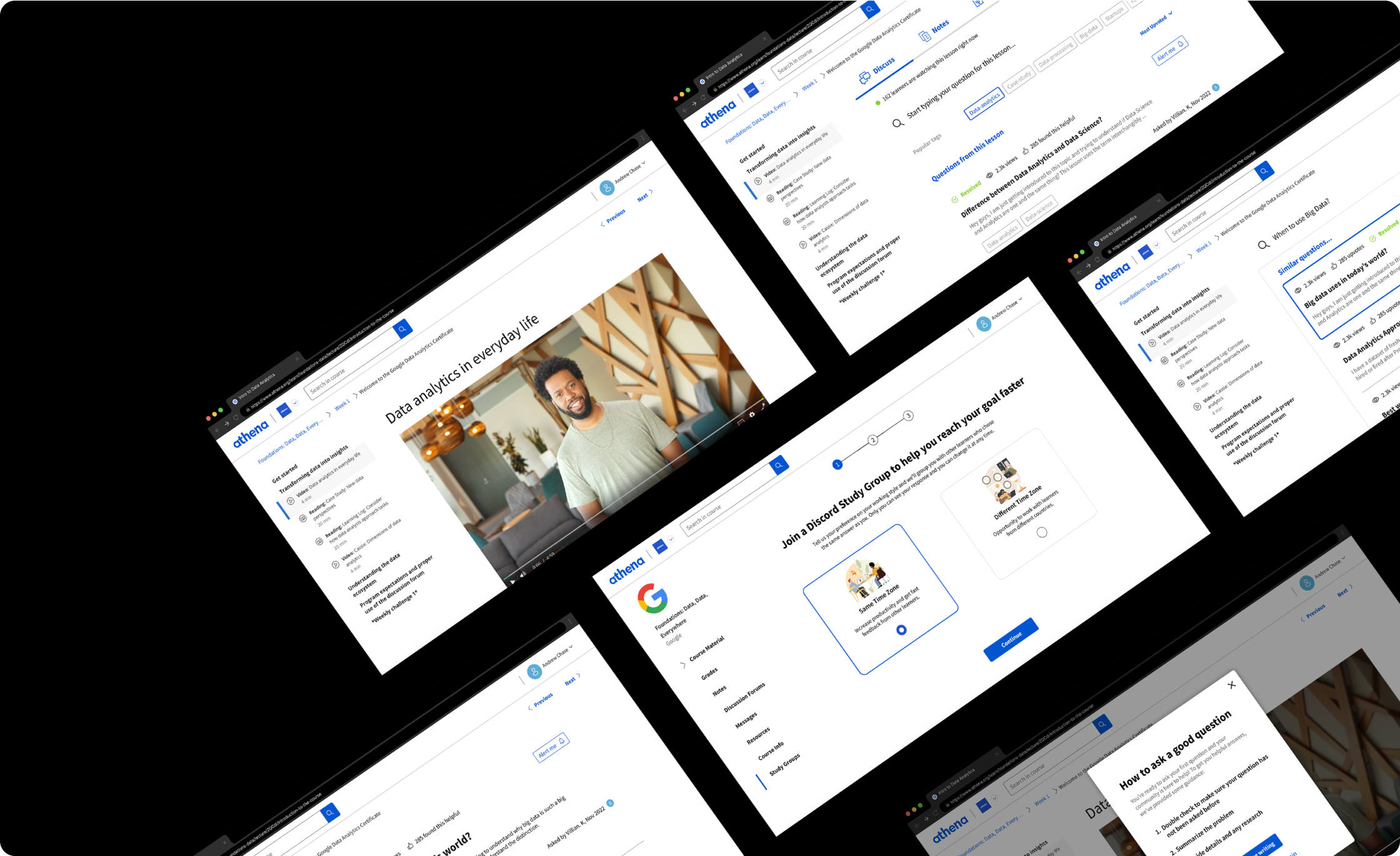Athena | Online Learning Platform
Supporting online learners to initiate the learning process with confidence

Role
User Research
Interaction Design
UI/UX Design
Timeline
10 weeks
Jan’23 - Mar’23
Tools
Figma
Adobe Illustrator
Miro
Team
Ana Carvallo
Patrick Giavelli
Seungyeon Kim
About Athena and Professional Certificate Programs
This project was pursued in collaboration with Athena(pseudonym), one of the world’s biggest online learning platforms that offers a wide range of courses, specializations, and degree programs. Athena partners with top universities and organizations around the world to offer high-quality educational content to learners everywhere.
The Professional Certificate Programs(PCP) are special programs by Athena that aim to provide industry-certified courses sponsored by giant technological companies at affordable rates to online learners that get them job-ready for the tech industry in less than a year. For our project, we were working specifically with PCPs and the learners enrolled in these programs.
The Professional Certificate Programs(PCP) are special programs by Athena that aim to provide industry-certified courses sponsored by giant technological companies at affordable rates to online learners that get them job-ready for the tech industry in less than a year. For our project, we were working specifically with PCPs and the learners enrolled in these programs.
The Challenge
50% of users on PCPs do not start their learning journey at all
Users inactive for more than 72 hrs never return to the platform
According to company data, 50% of the total number of people who enrolled in Professional Certificate Programs on Athena did not initiate their learning process by taking the first lesson. This implied that there was a huge user drop-off rate from the programs between the time of enrollment and actually starting the learning process. Our team was asked to determine the root causes for the drop-off rates and devise appropriate design interventions to mitigate this problem.
How might we
lower the barriers to initiating the learning process for online learners post-enrollment and motivate them to take their first steps with confidence while maintaining user retention for existing learners?
The Solution
Our solution focussed on providing new-learners with an adequate amount of support, confidence, and motivation by leveraging the power of the huge community of learners on Athena.
01
Feature | Study Groups
Sync your learning timeline with learners with the same time constraints as you by creating study groups instantly on various communication platforms like Whatsapp, Telegram or Discord. Having a dependable group of similarly motivated people can give you emotional support and also keep you accountable towards your goal.
02
Feature | Lesson specific Q&A support along slide learning
Having the ability the ask doubts while learning as and when they come up - pertaining to the particular lesson is key to instilling confidence among first time learners
03
Feature | Improved forum discussions
Effective categorization through question tagging to improve quality of answers and teaching how to ask good questions.
The Process

Sprint 1
Initial user interviews
To understand the learners’ experiences with professional certificate programs and identify the causes of initiation failure, we conducted 6 personal interviews on dscout. I played key role in preparing the discussion guide and led the discussion for 3 of these interviews.
Participants (6)
Goals for user interviews
Understand user’s mental model for navigating self-directed learning experiences online
Identify blockers that result in users drop-off after enrollment in certificate programs
Understand user’s unmet desires from online learning experiences
Key findings from user interviews
Drop-offs before course initiation
01 | FINDING
Lack of support from platforms for a confident start
Even after enrollment, users need time to understand the curriculum, timeline, reserving time for learning. Instead, they are bombarded with the lessons they need to take and get started asap.
02 | FINDING
Assignments can create a sense of aversion for new learners
As many learners are new to the field and looking to switch careers, the list of assignments and gradings shown even before they take their first class instills stress and demotivation.
03 | FINDING
Inability to communicate with other learners to discuss concerns/plans
Before starting their journey, learners want to connect to other learners who are currently taking the course to know their experience and other practical questions about the course.
Drop-offs between initiation and completion
04 | FINDING
Free trial - low accountability towards course completion
As Athena provides a free trial, most enrollments are not highly motivated to complete the course, they need and additional push to keep their momentum going and remain accountable.
05 | FINDING
Different experience levels and starting points for different users
While some learners are new, others are experienced in the field. This disparity can demotivate both learners when they cant find appropriate peers to discuss topics at the same level.
06 | FINDING
Lack of goal-driven learning and sense of achievement
The platform does not provide positive reinforcements to keep learners going. It also does not celebrate key milestones when users complete various checkpoints that can crush their willingness to learn.
User Journey Blueprint
The following map outlines the interactions with the platform (post-enrollment) of a new learner who is enrolled in the Professional Certificate Program. Key pains and opportunities are highlighted.

Competitive Analysis
In order for us to solve the problem of learner initiation on Athena, it was important to understand the user experience and approach that other ed-tech and learning platforms take to ensure a confident start and continuation from their users.

Salient Features
Gamified learning: Lessons are taught in a friendly and motivating manner that creates a sense of achievement with every level that is completed.
Personalization: Users can gauge their level of expertise with a pre assessment before they start a lesson which creates a personalized experience with adjusted difficulty level.
Healthy competition: Users have the ability to follow fellow learners and observe their progress and leaderboards to not fall behind.
Goal oriented learning: Users can set their own personal study goals which create a sense of self-check while allowing users to work at their own pace.
Community interaction: Users have the ability to join learning groups where they discuss similar topics and doubts and even connect with each other on Linked In.
Level distinction: Users can choose a difficulty level and pursue courses that match their own level of confidence and expertise.
Specialized expensive courses: Courses guided by dedicated instructors that provide quality education but at a higher cost - this attracts only serious learners who start and finish on time.
Personalized plans: Users have the option to choose the level of intensity and instructor involvement according to their needs.
Overall insights
01 | INSIGHT
Community engagement and interaction fosters a sense of confidence, accountability, and commitment
There is a desire to feel a greater sense of connection analogous to a traditional classroom setting. Discussion and support from fellow learners can boost learner-confidence.
"So the reason why I like the in person learning a little bit better is because I'm held accountable and I don't wanna fall behind."
~ Maggie
02 | INSIGHT
Learners start at different levels of experience and commitment hence desire a more personalized experience
Certain learners are starting with no prior knowledge on the topic, while others are looking to supplement their skills and get certified. This implies different motivators.
"Everybody learns differently. Everybody comprehends differently. And that part right there should be acknowledged"
~Jasmine
03 | INSIGHT
Goal-driven learning boosts motivation to complete tasks
Positive reinforcements and "small wins" significantly increase user confidence and engagement
"I like that there is a carrot at the end of completing a task"
~ Jordan
Opportunities
01 | OPPORTUNITY
Create a sense of accountability through interpersonal connections
Providing an environment where learners can freely discuss doubts/assignments, interact with fellow learners to keep each other accountable would help users feel more in control of the course.
02 | OPPORTUNITY
Group users with similar experience and learning styles
Finding similar types of learners based on experience and learning habits to provide them with a group where everyone can learn at the same pace. This would prevent users from feeling demotivated and isolated.
03 | OPPORTUNITY
Incentivize users to start a course through a reward system
Professional certificates are long-term goals and can be overwhelming before starting. By creating smaller, more arbitrary goals, users can more easily celebrate their progress and maintain their momentum.
Initial exploratory concepts and features
Based on the insights from out interviews and market analysis, our team brainstormed 3 main concepts to explore.
01 | CONCEPT
Curated cohort system that fosters support and accountability
New users are split into smaller cohorts of similar users - curated on the basis of their background info and learning style. Users are able to chat and create groups within the cohort. This model promotes interpersonal connections and accountability.
02 | CONCEPT
Optional quiz - level of expertise measure for personalized learning
New users take an optional quiz to measure their confidence and level of expertise before starting. Users with higher scores are recommended a faster-pace course while novice learners start at a beginner level.
03 | CONCEPT
Using external motivators to make users start asap
Making users understand the importance of starting sooner rather than later is important reduce drop offs before starting. Creating a sense of urgency to initiate the learning process via emotional and reward triggers.

Low-fi Designs
I took a lead in creating fast wireframes in order to quickly test the concepts on users. The features are presented in the below low-fi designs.

Sprint 2
Concept validation interviews
Before moving forward with any of the concepts, it was vital to pressure test them with users who were familiar with online learning platform on Athena. We conducted testing sessions with 5 participants to gain more insight into their needs. I led the discussion for 2 of these interviews.
Participants (5)
Age: 18 - 50
Race and Ethnicity: African American | Asian | White
Career Status: Currently unemployed | Working full-time but looking to switch industries
Prerequisite: Participants must be existing learners on Athena’s certificate programs
Goals for user interviews
Test if interactions with other learners within a cohort can be motivating for online learners to initiate sooner.
Understand what kind of interactions and information are necessary for online learning to be successful.
Understand shortcomings in the existing discussion forum experience on Athena.
Discover what kinds of rewards can motivate users to start asap and keep continuing the course.
New findings and feedback
01 | FINDING
Pre defined cohorts can create a feeling of forced participation
Users like the ability to communicate and support other users in the cohort, but might feel stuck if that’s not right for them. They also perceived cohort interaction as a pre-requisite for completing the certificate.
02 | FINDING
No amount of external rewards can make a user start if they are not ready
We realized that only self-motivated learners are prepared to complete their lessons and assignments when they are serious about the certification. A lot of users enrolled because of the free trial period.
03 | FINDING
Novice learners need 2 different kinds of support - Emotional and Academic
Learners who are trying to enter a new field suffer from imposter syndrome and need to find similar people who can encourage them to take the same steps as them.
04 | FINDING
Learner on Athena are dissatisfied with the existing discussion forum which don’t address their needs.
The current discussion experience was lacking in several aspects - users could not search for questions, there were no lesson specific filters on discussions, no way to check if a question was resolved among other issues.
05 | FINDING
Users actively look for study groups to join on platforms like Discord, Telegram, etc.
Learners on Athena find their own workarounds for an unsatisfactory discussion forum by posting group chat links to provide each other the desired support.
06 | FINDING
Gauging learner expertise through predefined assessments would yield inaccurate results
It is hard to test the expertise of a learner through quick quizzes prior to starting a program as the questions will not be exhaustive or complex. Creating proper assessments would risk user drop offs further if the questions were too hard.
Target user persona
From the second round of user interviews we were able to discover that the problem of non-initiation prevails among under confident new learners who are not sure about the course. Those learners who are sure about the course and their goals do not require as much help to get started. We then decided to narrow our focus to only such learners that need support.
"But for me, the human connection is really important...just to keep people accountable it would make a big difference"
Ned Newman
24, M, Aspiring Software Dev
Chicago, IL
About
Ned is an associate data analyst who recently joined Athena’s free 1 week trial for Meta’s Python Developer Certificate. He wants to switch his career path to Software Dev. He is quite under confident as he knows of the severe competition in this field. He has not been able to start because he thinks he is new to coding and is going to have silly questions that he’s too scared to ask. He checked out the discussion forum but was sad to find that most of the questions are unanswered. He is not sure if this is the right course for him.
Goals and Motivations
Earn Python Certificate to apply for jobs
Hopes to have all his basic concepts cleared
Wants to have his questions answered
Hopes to find a learner community with people like him
Frustrations
New to coding and afraid to ask doubts on discussion forum
He thinks he is alone and has crippling imposter syndrome
Doesn’t know who to approach when he has doubts
Has a very hard time navigating questions on the forum
Redefining the problem statement
From the second round of user interviews we were able to discover that the problem of non-initiation prevails among under confident new learners who are not sure about the course. Those learners who are sure about the course and their goals do not require as much help to get started. We then decided to narrow our focus to only such learners that need support.
How might we
leverage Athena’s community of learners to effectively support newly enrolled users to initiate the course and keep them motivated?
Design QA : Testing Athena’s discussion forum
After realizing that the existing discussion forum on Athena has left the users unsatisfied and has severe UX issues, . This further helped us create a list of features for our final design concept.

Augmenting conceptual approach - last moment pivot!
The validation interviews combined with the Design QA of Athena’s discussion forum revealed that our concept of cohorts needed a revision while keeping key features that target the root of the problem. After brainstorming - we repurposed cohorts into (1) Study groups and (2)
01 | SOLUTION
Study groups to increase emotional support and accountability
Given the immense need for study groups as evidenced in the public discussion forums, we designed a method for learners to join study groups on Discord (popular instant messaging platform) based on similar learning goals and commitment levels. People with similar motivations can understand each other better and provide appropriate support to each other from emotional to academic.
02 | SOLUTION
Revamping discussion forums to facilitate community interaction
The current state of Athena’s discussion forum leaves room for improvement. We added several features which would leverage the power of Athena’s learner community. These features include intelligent question searcher, quality answer detection, and reducing the barriers to asking questions to help learners ask lesson specific doubt while watching the lesson.
High fidelity designs
I designed the final high fidelity interactions that are shown at the top of the case study

Next Steps
Redirecting misfits to different courses
One major reason for users not starting the course after enrollment or failing to come back to the course was lack of interest in the course and because the course was not right for them. It is essential to perform regular check on the users and recommend other courses in that case.
One major reason for users not starting the course after enrollment or failing to come back to the course was lack of interest in the course and because the course was not right for them. It is essential to perform regular check on the users and recommend other courses in that case.
Onboarding support
Exploring gamification opportunities
Learnings and Takeaways
Vague problems and feasibility constraints can often force creative solutions.
Find the root cause of the problem than create a band-aid solution.
Fail quick and fail fast - always be prepared for last minute pivots.
